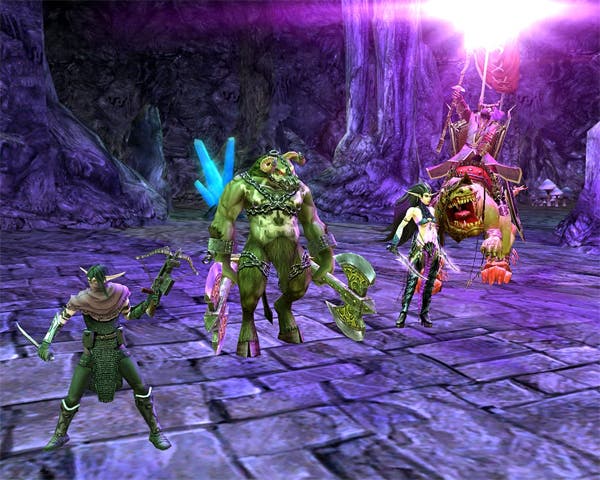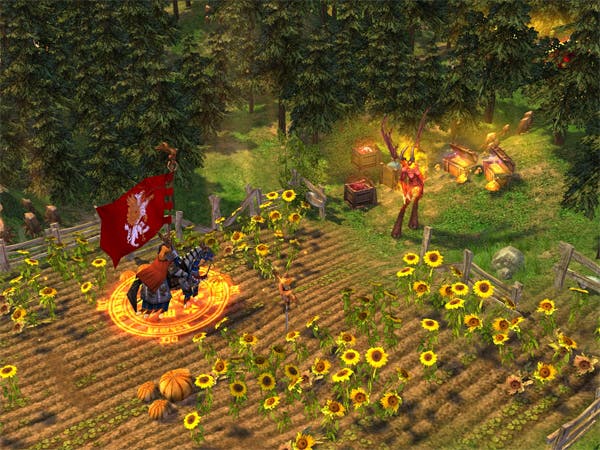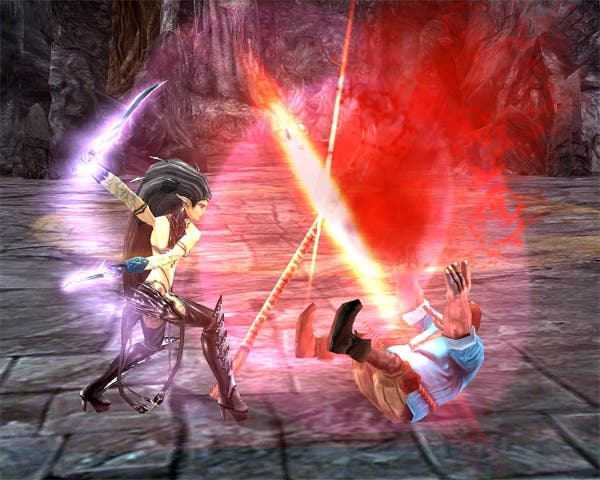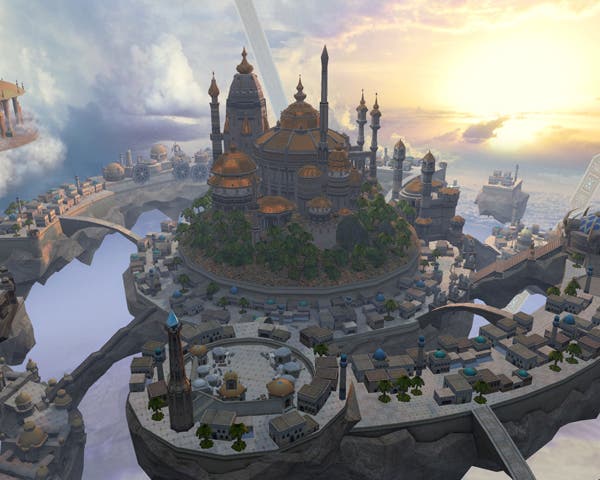Heroes of Might and Magic V
A return to form? Might be...
Think Heroes of Might and Magic, think Steve Guttenberg.
All right, maybe not, but that's how Stéphane Decroix sees it, and he is after all executive producer of the fifth instalment in the turn-based strategy series. He's here to present the game to us, and he begins by stating: "Heroes of Might and Magic was starting to fall apart. It's a bit like the Police Academy series, really."
We can sort of see the link - after all, just as HMMOV 3 is often praised for being the best game yet, we defy anyone to deny that Assignment Miami Beach marked a mid-series high point. And the good news is that, judging by what we've seen so far, Heroes of Might and Magic V is no Mission to Moscow.
In fact, it bears a lot more of a resemblance to the third game in the series than its immediate predecessor - and that's the result of a conscious decision made at the start of the design process by developer Nival, as associate producer Erwan Le Breton explains.
"We consulted the fans at a very early stage saying, "We're doing Heroes 5, what are your expectations?" Most of them said, in essence, "We want Heroes 3, with new graphics." That's about it!
"So of course we did more than that but that was the main idea, and Nival was totally in tune with that and with the fans of the Heroes series. They worship Heroes 3, it's like they kneel in front of it each morning when they go to work... So we knew that they wouldn't alienate people who like the Heroes series, and especially that game."
Le Breton explains that there are three key concepts they wanted to keep in Heroes 5. The first is the way that the world is divided into factions - but this time around, you'll learn all about the history of how the factions came to exist and their motivations for fighting each other.
The second concept is, "The epic dimenson of the Might and Magic games - it was always about saving the world or destroying it, fighting hordes of monsters, becoming a very powerful character, exploring huge elements et cetera... We wanted to keep all that," says Le Breton.
Morals of the story

And finally, Heroes 5 will also see the return of the sense of moral ambiguity which was present in the previous games: "Good people were not that good, bad people were not that bad, the different factions were not black and white."
There's a twist or two, however. "Now if you play as the necromancers, for example, you will find that you have motivations. It's not like you are just an evil guy who wants to rule the world - you've got a past history that explains your reasons.
"And if you play as the white knights, as another example, you can play the good samaritans, helping people and being compassionate; or you can play as a fascist, burning people at the stake for criticising you. So it works in two ways."
But as Le Breton says, although Heroes 5 has maintained these key elements in a bid to stay true to the essence of the series, Nival has also made number of important changes to the game. Many of these are designed to make it more accessible, as producer Fabrice Cambounet explains.
"The objective we decided on very early on was to stay true to the series, to keep the gameplay system, but also to make the game faster to play and easier to access. So that means a whole lot of changes in terms of interface, game balance, tutorials and so on."
But that doesn't mean the game has lost any of its depth, Cambounet argues. "The complexity of the game - the number of creatures and skills, and tactics you can use on the battlefield - are still present. But you don't spend as much time reading text, opening and closing pop-ups, moving around the battlefield... We don't want to make the game simpler, but easier to access."
Master class

Fair enough, but doesn't this sort of thing always mean you run the risk of alienating hardcore fans? Maybe, says Le Breton, but he's not too worried. "All the options that used to exist are still here - it's just now you're helped to understand what's good and what's wrong.
"You don't have to know the game by heart to play well, but of course if you are an expert at playing the Heroes series it'll be very familiar to you, and you'll become a master very quickly."
It's not just the game's interface which has seen a healthy overhaul. There have been major changes to the battle system, too - arenas are no longer laid out in perfect squares as before, but are made up of an 8 by 10 grid.
That wasn't always the plan though, according to Decroix. Initially, they wanted to go for two layout options - a 7 by 7 square, and a larger 12 by 14 arena. But after mucking about with this concept for no less than 18 months, they had to concede that there were too many problems (the smaller arenas were just too small, and the larger ones were so big you spent half the battle just moving towards your opponents so you could attack). So they went back to the drawing board and settled on the 8 by 10 option, which Decroix says makes battles "much faster and more intense."
And if you like your battles extra fast, you can now take advantage of the game's new dynamic mode. This means that although battles still play out on the traditional game board, there's no time to spend ages pondering your next move - you only have a few seconds to make a decision, and if you don't pull off an attack in time you'll forfeit your turn.
The amount of time you get depends on the type of character you're dealing with - you only get 5 seconds to decide what your unicorn should do, for example, while spellcasters have a bit more leeway. You can also opt to fight multiplayer battles using the dynamic system, and that's not the only new mode available for those who prefer to fight it out with friends.
Giving up the ghost

The problem with the multiplayer modes in many turn-based games, Decroix explains, is that you often spend a lot of time sitting around and getting bored while you wait for your opponent to make their move. By way of finding a solution to this, the development team came up with the all-new ghost mode.
It works like this: while your opponent is making their decision, you can move your character around a strange, ethereal and very blue version of the game board. As you move around you can take advantage of all sorts of useful options - you can mine gold, put curses on your opponent's troops so their movement is limited, possess neutral creatures and make them join your team and so on.
Moving around costs "energy points" - the longer your opponent takes to make their move, the more points you earn and the further afield you can explore. At the start of the game you only get one ghost to play with, but you can earn new ones by completing special quests as you make your way around the multiplayer maps. And if you don't like the sound of it all, don't worry - ghost mode can be turned on or off as you please.
Then there's duel mode, which allows you to set up multiplayer battles that last for a maximum of 20 minutes when you don't have time for a marathon session. Decroix says the team was inspired by arcade fighters such as Tekken and Soul Calibur, interestingly.
You start out by selecting your hero from a choice of 18 (there are three of each race in the game). Then you get a pre-selected army to arrange on the battlefield as you see fit, before fighting it out with your opponent over three rounds. Apparently this is very handy for experimenting with new tactics, or trying out heroes and races you're not used to playing with.
Going solo

So it's clear that the multiplayer mode is getting some significant enhancements, but those who prefer to go it alone can rest assured that Nival has also spent a lot of time on making sure the single player campaign is just as much fun to play.
It's spread over 30 missions, and over the estimated 60-80 hours it'll take you to complete the game you'll get to play as "six different factions one after the other, centred around one plot," Le Breton says. "It's really something that you never had the chance to experience in Heroes before."
Another new element is the way different missions are introduced. "In previous games it was mostly a long page of text that you had to scroll through to read," Cambounet says.
"But now we are spending a lot more time recording voice dialogue and making cutscenes that present the scenario in a much more interesting way."
So what of all those fans who requested better graphics? Well, Cambounet says they won't be disappointed. Heroes 5 will be the first game in the series to feature fully 3D polygonal graphics, and there's also a 3D camera that you can use to zoom in on the map when you're off exploring.
During battles you can expect to see some highly impressive character animations and special effects, and you'll be able to see whose turn it is to attack next on a bar displayed at the bottom of the screen - "It's a much more user-friendly system," Decroix says.
History repeating

But fancy graphics aside, as far as gameplay goes Heroes 5 is looking very similar to previous instalments in the series - specifically the third one. So what went wrong with Heroes 4, anyway, and how are they going to avoid falling into the same traps?
"My own personal opinion is that there were balance problems within the different factions in Heroes 4... There was this problem with heroes really being heroes on the battlefield," says Le Breton.
"When I played it, I was basically playing a kind of role-playing game, just making my heroes more powerful, and so I didn't play it as much [as Heroes 3]. Now the heroes are still very important, but they don't replace units - armies are still what make you win or lose in the end."
All in all, it seems clear that Ubisoft is keen for Heroes 5 to herald a return to form for the series, and the development team is sticking relatively closely to the Heroes 3 template as a result. In the future, though, there is a possibility they'll try something a bit more adventurous, as Le Breton explains.
"With Heroes 5, we wanted to show the world that we are capable of doing a good Heroes game that is very faithful to the gameplay experience of the brand. But of course, turn-based strategy games have evolved, and there are lots of new features in other kinds of games that we would like to implement in the Heroes series. And so, Heroes 6 would maybe be the game that changes the series, and takes it in another direction."
There's a good while to wait, though. Le Breton says that once Heroes 5 is finished the team is likely to be working on an add-on due for release in a year or so, and even then there are other options to consider.
"For now we're really focused on another Might and Magic game, but something different - maybe an RPG, maybe an action RPG, maybe something else," he says.
"There are a lot of options left, so I think first we'll try to do something with this blank spot on the map before we come back to Heroes."
How about a turn-based Police Academy game, then? Hmm, maybe not...


